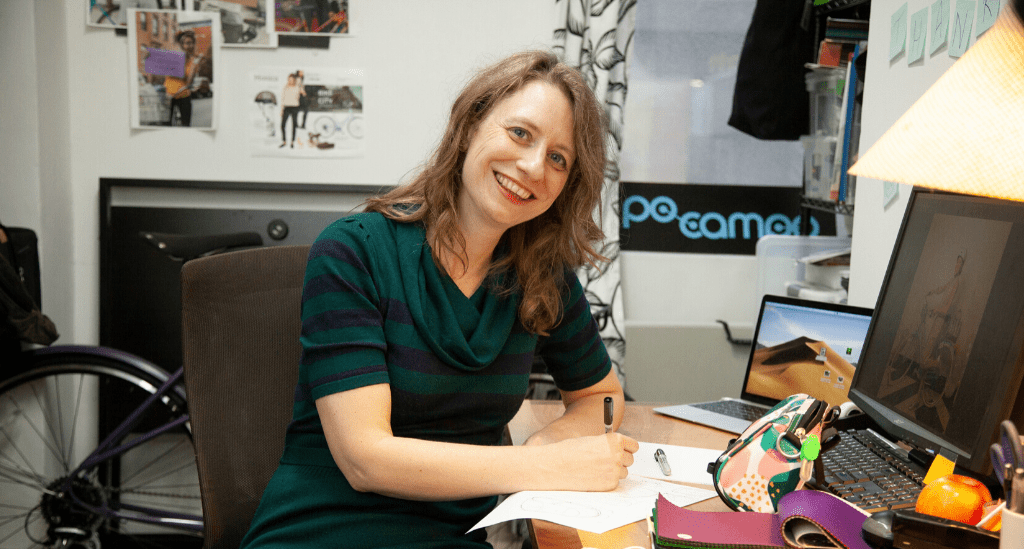Inspiration came to Maria Boustead during her routine bike commute.
“I had a makeshift way of transporting my bag. I would bungee cord my normal bag to the top of my bike and then one day I thought, ‘there must be a better way.’”
Using her experience as an industrial designer and her knowledge of the market, Maria started making bags that were practical enough to attach to a bike, yet professional and stylish enough to take into the office. What resulted was Po Campo, which officially launched in 2009.
As Maria found more freedom in her life becoming her own boss, it was echoed in her business’s vision: “The beauty of the bicycle is that it allows people to access adventures and discover new things, and we’re trying to make this lifestyle more accessible to our customers.”
For 10 years, her functional yet fashionable weatherproof bike bags have made biking more accessible and practical for women and girls around the world, and her business has supported environmental sustainability in its practices and through advocacy.
Chasing the curve, and staying ahead
When Maria founded Po Campo, biking had not yet reached the levels of enthusiasm it has today. “I got started before bike share and even bike lanes for the most part,” Maria explains. “I knew these were trends that were coming and that biking for transportation was on the verge of becoming increasingly popular.”
At the time, the bike industry was also hyper-focused on the sport aspect of cycling. “I recognized that for many people, biking is a lifestyle,” says Maria. “I wanted to create a product that could fit this evolving market and the shift I was seeing in biking culture.”
Her debut in the industry was not without challenges. With an industry primarily made up of male business owners and influencers, Maria often felt like an outsider.
“I was solving a problem that a lot of the men in the industry haven’t really experienced,” she explains. “It made it hard to sell the bag in stores at the beginning, but I overcame this hurdle by bringing brand awareness to the underserved markets within the bike industry, and by creating a good product that our target market wanted to buy.”
As her business has grown and expanded, Maria has seen a change of heart in the industry leaders. “Once our sales and reputation started increasing, most of the men that originally resisted eventually came around.”
An integrated culture of giving back
An important facet of Po Campo’s business model is its partnership with World Bicycle Relief (WBR), a Chicago-based nonprofit that works to mobilize individuals through the power of bicycles.
“In the developing world, many people – especially women and children – face barriers when it comes to transportation, which makes it harder to complete everyday tasks like going to school, visiting a health clinic or delivering goods to market,” Maria explains. “Oftentimes, it can be a four-mile walk for these women and children to get to where they need to go.”
WBR is working to break down these barriers by providing “specifically-designed, locally-assembled, rugged bicycles” to individuals in developing nations. “We partnered with WBR so that every time we sell 50 bags through our online store, we donate the equivalent of a bicycle to a girl in Africa,” Maria says. “With a bike, they can get to these places in 30 minutes, so it makes the journey much easier and more doable.”
In addition to providing the bicycles, WBR offers training on how to repair the bicycles to keep the initiative sustainable.
“From the very beginning, I knew that I wanted to partner with a charity,” Maria explains regarding the WBR partnership. “I appreciate that the organization focuses on empowering women and girls through bikes. As a woman, I have often felt alone in the bike world, like I was not taken seriously. I like that WBR is changing bike culture and making it more accessible to females.”
In addition to the WBR partnership, Maria supports and volunteers with WE Bike NYC, a 503(c)(3) nonprofit that works to get more women involved in biking in New York City, and is on the Board of Directors for the League of American Cyclists, America’s oldest bike advocacy group.
Looking to the future
Today, Maria has expanded and moved production of her bags to a new factory that supports her business’s goals for sustainability. Pursuit supported her move with a $10,000 SBA Microloan to cover the cost of a down payment. Po Campo’s bags are still the only bike bags on the market that customers would use on days they’re not biking.
“Most bags that attach to bikes on the market aren’t really designed to carry off a bike,” says Maria. “Our bags are functional, versatile, adaptable and stylish.”
Maria’s goals for the future of her business are ambitious: “My ultimate vision is when I look out the window, I see more people biking and I see more of these people with Po Campo bags on their bikes. In a larger sense, I would like Po Campo to play a part in making America more bike-friendly.”
